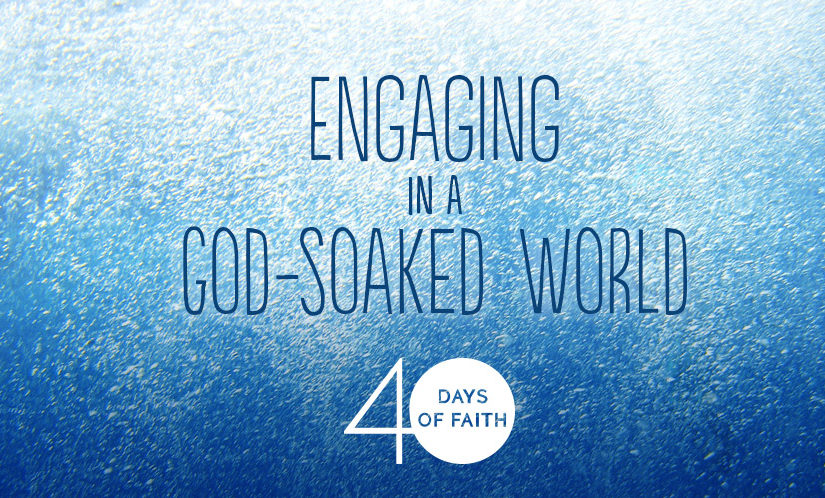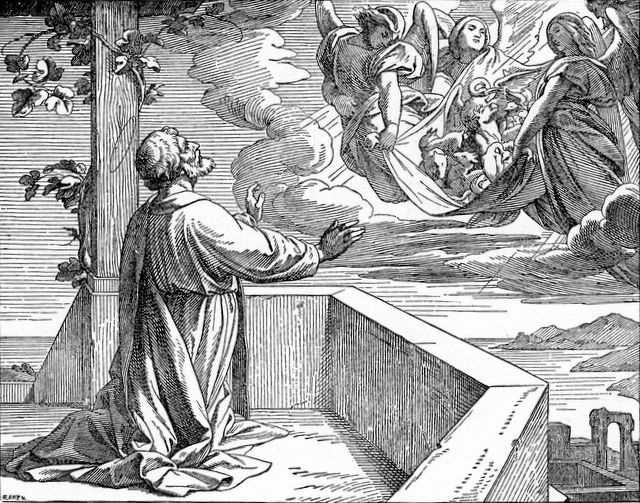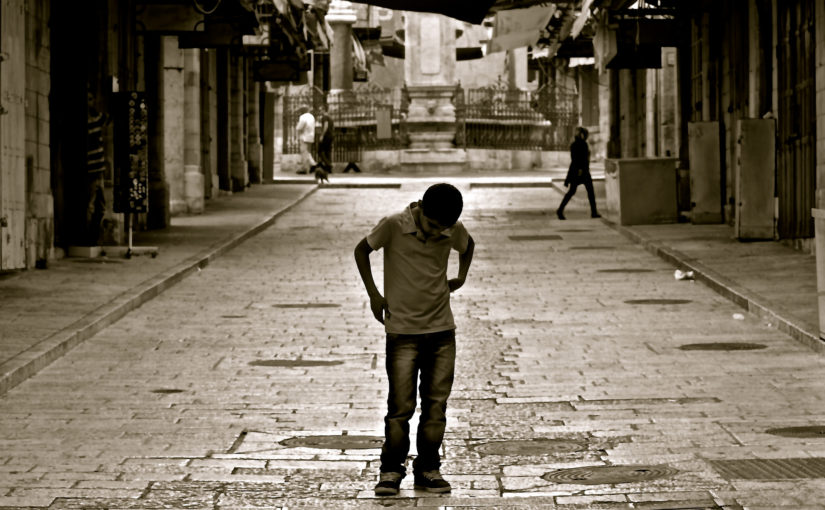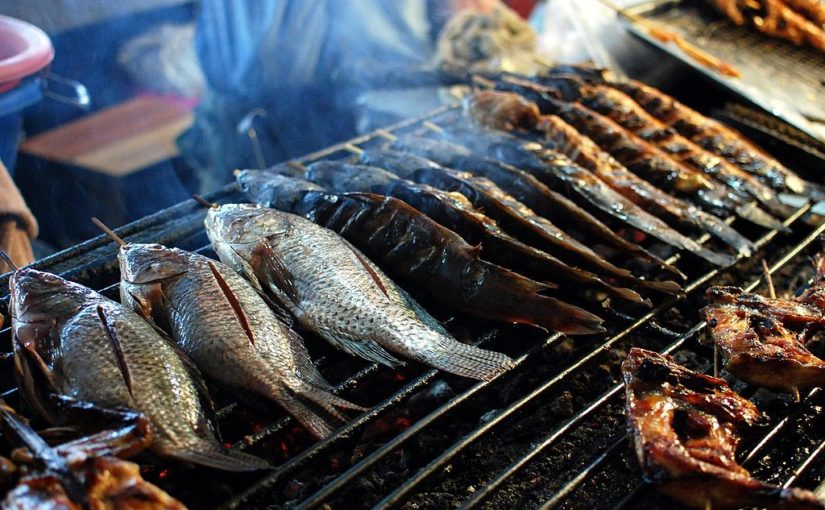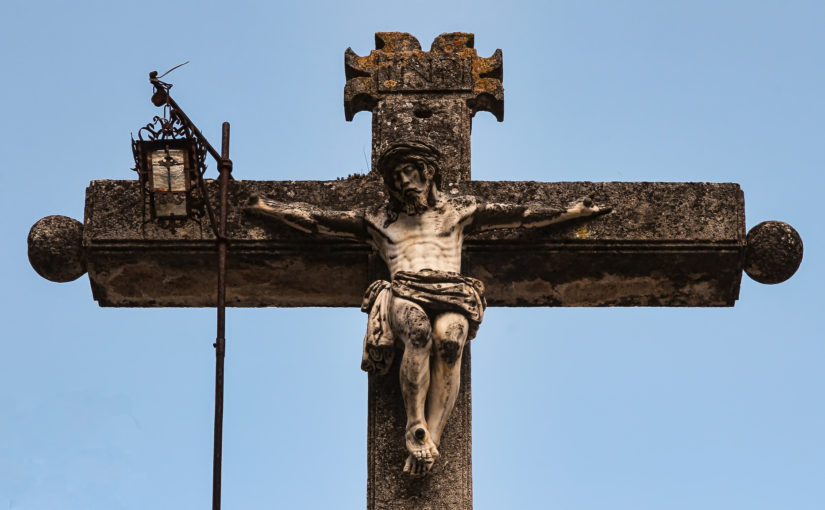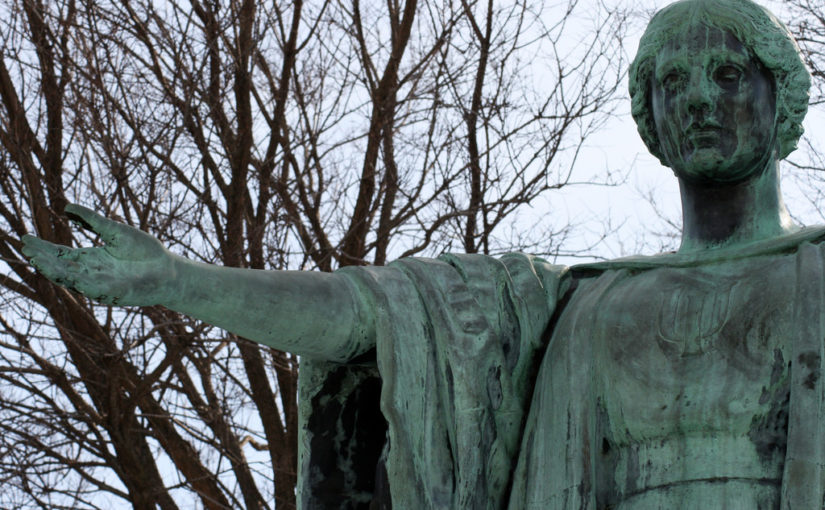Thursday, April 13– Acts 10:1-20, 34-38
10 In Caesarea there was a man named Cornelius, a centurion of the Italian Cohort, as it was called. 2 He was a devout man who feared God with all his household; he gave alms generously to the people and prayed constantly to God. 3 One afternoon at about three o’clock he had a vision in which he clearly saw an angel of God coming in and saying to him, “Cornelius.” 4 He stared at him in terror and said, “What is it, Lord?” He answered, “Your prayers and your alms have ascended as a memorial before God. 5 Now send men to Joppa for a certain Simon who is called Peter; 6 he is lodging with Simon, a tanner, whose house is by the seaside.” 7 When the angel who spoke to him had left, he called two of his slaves and a devout soldier from the ranks of those who served him, 8 and after telling them everything, he sent them to Joppa.
9 About noon the next day, as they were on their journey and approaching the city, Peter went up on the roof to pray. 10 He became hungry and wanted something to eat; and while it was being prepared, he fell into a trance. 11 He saw the heaven opened and something like a large sheet coming down, being lowered to the ground by its four corners. 12 In it were all kinds of four-footed creatures and reptiles and birds of the air. 13 Then he heard a voice saying, “Get up, Peter; kill and eat.” 14 But Peter said, “By no means, Lord; for I have never eaten anything that is profane or unclean.” 15 The voice said to him again, a second time, “What God has made clean, you must not call profane.” 16 This happened three times, and the thing was suddenly taken up to heaven.
17 Now while Peter was greatly puzzled about what to make of the vision that he had seen, suddenly the men sent by Cornelius appeared. They were asking for Simon’s house and were standing by the gate. 18 They called out to ask whether Simon, who was called Peter, was staying there. 19 While Peter was still thinking about the vision, the Spirit said to him, “Look, three men are searching for you. 20 Now get up, go down, and go with them without hesitation; for I have sent them.”
…. Peter greets the messengers, and after having them stay in his home overnight, travels with them to Cornelius’ household. There, Cornelius tells Peter why he sent for him, and Peter realizes that his vision about the animals applies especially to people – that though his religious culture fears outsiders, he shouldn’t call anyone unclean. ….
34 Then Peter began to speak to them: “I truly understand that God shows no partiality, 35 but in every nation anyone who fears him and does what is right is acceptable to him. 36 You know the message he sent to the people of Israel, preaching peace by Jesus Christ—he is Lord of all. 37 That message spread throughout Judea, beginning in Galilee after the baptism that John announced: 38 how God anointed Jesus of Nazareth with the Holy Spirit and with power; how he went about doing good and healing all who were oppressed by the devil, for God was with him. 39 We are witnesses to all that he did both in Judea and in Jerusalem. They put him to death by hanging him on a tree; 40 but God raised him on the third day and allowed him to appear, 41 not to all the people but to us who were chosen by God as witnesses, and who ate and drank with him after he rose from the dead. 42 He commanded us to preach to the people and to testify that he is the one ordained by God as judge of the living and the dead. 43 All the prophets testify about him that everyone who believes in him receives forgiveness of sins through his name.”
44 While Peter was still speaking, the Holy Spirit fell upon all who heard the word. 45 The circumcised believers who had come with Peter were astounded that the gift of the Holy Spirit had been poured out even on the Gentiles, 46 for they heard them speaking in tongues and extolling God. Then Peter said, 47 “Can anyone withhold the water for baptizing these people who have received the Holy Spirit just as we have?” 48 So he ordered them to be baptized in the name of Jesus Christ. Then they invited him to stay for several days.
Points of Interest:
- Peter has been the hero of the early chapters of Acts. In this series of events, though, Cornelius is the most impressive character and Peter occupies the humble position of a learner. The best leaders continue to adapt, learn, and grow, as do the best followers of Jesus.
- Cornelius being a Gentile captain of a 100-soldier Roman division would have made him suspect in the eyes of first century Jews and Christians alike. Our author tells us he was actually a good guy. (However disgusted we might be by slavery, Cornelius’ slave ownership wouldn’t have ruined his reputation with Acts’ original audience – most high status Romans owned slaves.) Cornelius was also a God-fearer; God-fearers were non-Jews who didn’t convert to Judaism but respected or even worshipped the God of the Jews.
- Cornelius and Peter both have strange and vivid afternoon times of prayer. God gets Cornelius’ attention, and Cornelius acts on the vision he gets during prayer. The next day, a hungry Peter dreams of God trying to get him to eat all kinds of food that God’s law commanded him not to eat. What was that about?
- Well, God can apparently change God’s law. I like that the voice – presumably from God – blames Peter for calling these animals unclean or profane, when Peter didn’t exactly make that idea up himself. It comes from the Levitical holiness codes in the Bible that themselves divide all kinds of things – food included – into sacred and profane, clean and unclean. God’s either had a change of heart on this, or the purpose of this division was time and culture bound and is no longer relevant. Peter’s understandably confused when he answers his doorbell with his vision in mind.
- In hearing that at that very moment there are Gentile God-fearers looking for him to teach them about God, Peter realizes the point of his vision. As much as it’s about animals, it’s even more about people. God’s including all people, all cultures, all tribes in God’s family, on equal footing. This is a central, lynchpin insight in the book of Acts, one that Peter and most early Jesus followers didn’t see coming, and one they had a hard time learning as well.
- In the moment, though, Peter gets it. He enters Cornelius’ household, tells them they too can be accepted by God, and gives them a summary of the life and good news of Jesus. Jesus is impressive, Jesus died and then beat death, God put Jesus in charge of all things, and Jesus offers forgiveness and peace.
- As evidence of their inclusion in God’s family, Cornelius’ household experiences the filling of the Holy Spirit. Perhaps, given the historic significance of their new faith, it helped them and Peter that the Holy Spirit’s presence was so physically and spiritually obvious to everybody.
Prayer for our six – Perhaps some of your six have had spiritual interest or interest in God but haven’t been attracted to a particularly Christian expression of faith, or have felt excluded or distanced from what they know of Jesus-centered faith. If so, pray that God would communicate the good news of their inclusion in God’s family. Pray that each of them, to whatever extent they respect God, would have their faith become deeper and more personal.
Spiritual Exercise – This week our spiritual exercise will focus on hearing an invitation from the Spirit of God to a joyful life and welcoming the power of the Spirit of God to that end. What joy would you experience if you had the opportunity to show someone else they can be accepted and known by God, and fully included in God’s family? Pray that the Spirit of God gives you power to have this experience.
Additionally, are there any particular people or people groups that your own faith or religious heritage has taught you to believe are unacceptable to God? Ask God if there are any ways you need to adapt and learn and grow in your understanding of God’s family.


